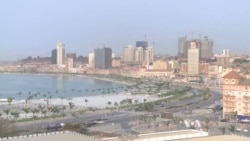In the last decade, the nation of Angola has pulled off what some experts consider an economic miracle, transforming itself from a nation torn apart by a brutal civil war into sub-Saharan Africa’s third largest economy.
Describing this conversion as nothing short of unimaginable, the University of Oxford lecturer has written a new book exploring its meteoric rise, Magnificent and Beggar Land: Angola Since the Civil War.
“Angola had a civil war that lasted for 41 years and that killed a million people. By the end of it, obviously, Angola was in tatters. What happened over the subsequent decade was absolutely extraordinary,” he told VOA ahead of a talk in Johannesburg. “The economy of Angola multiplied 10-fold. It’s the greatest growth story in the world in the early 21st century.”
Not so fast, say critics of Angola’s government, who accuse officials of being increasingly repressive, and describe the growth as grossly unequal.
Earlier this month, Angolan authorities beat up and set police dogs on mothers of political prisoners who had gathered for a march in the capital. Their children had been arrested for participating in a book club discussion on peaceful protest of tyrannical governments.
“The government continues targeting outspoken journalists and activists with criminal defamation lawsuits, arbitrary arrests, unfair trials, intimidation, harassment, and surveillance,” Human Rights Watch said in its 2015 report. “The police use excessive force and engage in arbitrary arrests to stop peaceful anti-government protests and other gatherings.”
Oil boosts growth rate
Throughout, growth has continued unabated. Angola’s massive oil wealth — it is the second-biggest oil producer in Africa behind Nigeria — still gave the nation a growth rate of 4.7 percent in 2014 despite falling global prices.
Angolan activists have said the growth fails to benefit everyone, echoing World Bank estimates that indicate a third of Angolans remain in poverty.
Elias Isaac, the Angola program manager for the Open Society Initiative for Southern Africa, says post-war Angola had nowhere to go but up even if that development left too many people behind by largely benefiting those with government ties.
Development, he said, “was necessary, but the problem is the way it was done. It came at the cost of a lot of people [who] have been completely marginalized and excluded from this process.”
Is it development at all?
Journalist and activist Rafael Marques de Morais, whose critical coverage of the government landed him in court, says he was recently convicted and given a six-month suspended jail term for defaming military officials in a book that uncovered abuses in the nation’s diamond fields.
He continues to be an outspoken critic of the government and what he describes as the "so-called development" it has brought to Angola.
“What development?” he said. “That’s the question we have to ask. When you build high-rises in Africa — especially in countries like Angola, where there are so many — people tend to believe that the high-rises translate into development, but that’s not true.
"It has the highest child mortality rate in the world, worse than Afghanistan," he added. "What development is that that we cannot provide the basics to save children?”
In his view, that is the question confronting Angolans who find themselves surrounded by glittering high-rises and meteoric development while still mired in poverty.





